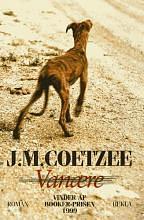Take a photo of a barcode or cover
dark
emotional
mysterious
medium-paced
Plot or Character Driven:
Character
Strong character development:
Yes
Loveable characters:
No
Diverse cast of characters:
Yes
Flaws of characters a main focus:
Yes
dark
sad
tense
fast-paced
challenging
dark
sad
tense
slow-paced
Plot or Character Driven:
Character
Strong character development:
No
Loveable characters:
No
Diverse cast of characters:
Yes
Flaws of characters a main focus:
Yes
challenging
dark
emotional
reflective
sad
tense
medium-paced
Plot or Character Driven:
A mix
Strong character development:
Yes
Loveable characters:
Complicated
Diverse cast of characters:
Yes
Flaws of characters a main focus:
Yes
dark
emotional
tense
medium-paced
Plot or Character Driven:
Character
Strong character development:
Yes
Loveable characters:
No
Diverse cast of characters:
Yes
Flaws of characters a main focus:
Yes
Here is a New Yorker article about this novel: Reading J. M. Coetzee’s “Disgrace” During the Harvey Weinstein Trial https://www.newyorker.com/culture/cultural-comment/reading-j-m-coetzees-disgrace-during-the-harvey-weinstein-trial
Really not sure what to think about this... it's disturbing and unsettling and sticks with you which is something I generally really enjoy in books. But on the other hand, fucking hell that was bleak.
Once I put down Disgrace, I knew it was going to my to re-read collection, even though it contains some really really heavy and harrowing subject matter and story beats.
There's many reasons for wanting to reread Disgrace someday, but I think one reason is that author JM Coetzee is a masterful novelist. Disgrace is achievement of craft, just by how much density of story and affect is folded into this honed blade. In the hands of a lesser writer, the book's exploration of disgrace in all its ugly forms could become a sprawling, torturous read, but under Coetzee's pen, it becomes a deft and measured experience, and it leaves you impressed even as you are covered in cuts from the fray.
Covered in cuts is a good lead in to point two as to why I would love to re-read Disgrace,- that being the novel's multi-faceted exploration of the theme of disgrace. The book takes us through the trials of an intelligent yet very flawed literature professor, David Lurie. Lurie is a despicable figure, and this is exacerbated as we experience the novel through the filter of his unflinching inner world.
Whilst walking down the buffet spread of his flaws we might be able to see glimpses of ourselves? Lurie has his prejudices, his hangups, and as a well read scholar, he is wont to convince himself and sometimes the reader, into understanding or even agreeing with his viewpoints. While he is gifted with a keen self-awareness, he is equally keen to plant himself in the mire of his mind, convinced that you can't teach an old dog like him new tricks. (At 52, the dude even aint that old if imabehonest. Perhaps that's what angers me the most. That this spry spring chicken of a malleable middle aged man is trying to get in with the octogenarians of the bingo club down the street. But ok let's acknowledge that its part of his misguided psyche, and sorry I digress...)
The inciting incident of the novel is Lurie's sexual transgression involving a student of his university where he teaches communication studies. When faced with the disciplinary board, he is unwilling to yield to repentance, as his considers an apology and the effort at repentance as a disloyal rendering of his true nature:
"One can punish a dog, it seems to me, for an offence like chewing a slipper. A dog will accept the justice of that: a beating for a chewing. But desire is another story. No animal will accept the justice of being punished for following his instincts".
is what he tells his daughter later in the novel. He leaves the university, unwilling to change, for he believes to an extent that his lechery is in some sense, already baked into his being.
This is only one of the many many many (spoiler free) instances where the book challenges us to consider our relationship with shame, transgression, repentance, gender, race, socio-political history, the environment, and even with animals. There's really much to cover here, and not all will be explored to satisfactory ends. But I believe it is a journey worth undertaking under the guiding hand of a very confident writer.
I will definitely return to Disgrace someday when the cuts laid by the book have healed over, and when my eyes are just a little rheumier, and hopefully when I'm older and can take in the novel in new ways that it can offer.
There's many reasons for wanting to reread Disgrace someday, but I think one reason is that author JM Coetzee is a masterful novelist. Disgrace is achievement of craft, just by how much density of story and affect is folded into this honed blade. In the hands of a lesser writer, the book's exploration of disgrace in all its ugly forms could become a sprawling, torturous read, but under Coetzee's pen, it becomes a deft and measured experience, and it leaves you impressed even as you are covered in cuts from the fray.
Covered in cuts is a good lead in to point two as to why I would love to re-read Disgrace,- that being the novel's multi-faceted exploration of the theme of disgrace. The book takes us through the trials of an intelligent yet very flawed literature professor, David Lurie. Lurie is a despicable figure, and this is exacerbated as we experience the novel through the filter of his unflinching inner world.
Whilst walking down the buffet spread of his flaws we might be able to see glimpses of ourselves? Lurie has his prejudices, his hangups, and as a well read scholar, he is wont to convince himself and sometimes the reader, into understanding or even agreeing with his viewpoints. While he is gifted with a keen self-awareness, he is equally keen to plant himself in the mire of his mind, convinced that you can't teach an old dog like him new tricks. (At 52, the dude even aint that old if imabehonest. Perhaps that's what angers me the most. That this spry spring chicken of a malleable middle aged man is trying to get in with the octogenarians of the bingo club down the street. But ok let's acknowledge that its part of his misguided psyche, and sorry I digress...)
The inciting incident of the novel is Lurie's sexual transgression involving a student of his university where he teaches communication studies. When faced with the disciplinary board, he is unwilling to yield to repentance, as his considers an apology and the effort at repentance as a disloyal rendering of his true nature:
"One can punish a dog, it seems to me, for an offence like chewing a slipper. A dog will accept the justice of that: a beating for a chewing. But desire is another story. No animal will accept the justice of being punished for following his instincts".
is what he tells his daughter later in the novel. He leaves the university, unwilling to change, for he believes to an extent that his lechery is in some sense, already baked into his being.
This is only one of the many many many (spoiler free) instances where the book challenges us to consider our relationship with shame, transgression, repentance, gender, race, socio-political history, the environment, and even with animals. There's really much to cover here, and not all will be explored to satisfactory ends. But I believe it is a journey worth undertaking under the guiding hand of a very confident writer.
I will definitely return to Disgrace someday when the cuts laid by the book have healed over, and when my eyes are just a little rheumier, and hopefully when I'm older and can take in the novel in new ways that it can offer.
dark
emotional
reflective
sad
tense
medium-paced
Plot or Character Driven:
A mix
Strong character development:
Yes
Loveable characters:
No
Diverse cast of characters:
Yes
Flaws of characters a main focus:
Yes



